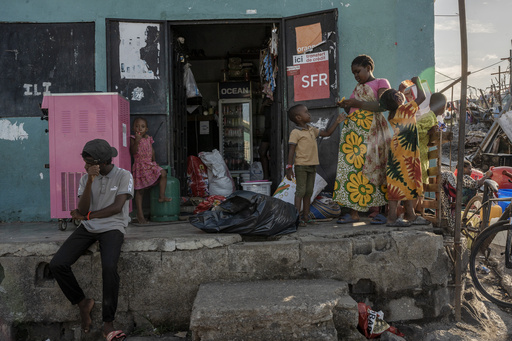
MIRERENI, Mayotte — During a recent visit to Mayotte, French President Emmanuel Macron faced significant backlash from local residents who are grappling with the aftermath of Cyclone Chido, the most powerful cyclone to impact the region in nearly a century. The overwhelming emotions of the crowd, which included boos and shouts for assistance, highlighted the widespread frustration directed towards the French government, situated about 8,000 kilometers away in Paris.
The residents of Mayotte, known for being the country’s poorest department, have long felt overlooked and underfunded by their government. Following the cyclone’s landfall on Saturday, many voiced their displeasure regarding the limited support and slow recovery efforts. The storm wreaked havoc across various neighborhoods and has led to fatalities, with unofficial estimates hinting that hundreds, if not thousands, may have died. The official count stood at 35 on Friday.
On Thursday morning, Macron toured a Tsingoni neighborhood where locals still lack access to essential services such as potable water and mobile phone connectivity nearly a week after the cyclone. While some individuals welcomed him and took the opportunity to have photos taken with the president, many others demanded immediate help, loudly expressing their need for water. The previous evening, the atmosphere turned sour in Pamandzi, where Macron was greeted with hostility as residents confronted him about the sluggish pace of aid distribution.
In a moment of frustration, Macron seized a microphone and stated, “I have nothing to do with the cyclone, you can blame me, it wasn’t me!” This statement illustrates his tendency to engage openly with critics, a characteristic he is known for. Although he acknowledged the hardships people are facing, he also countered complaints by remarking, “If it wasn’t France, you’d be 10,000 times more screwed!” He further insisted that residents were receiving more assistance than in any other part of the Indian Ocean, to which one woman could be heard disagreeing.
The aftermath of the cyclone has brought to light further discontent among locals. A female worker associated with Mayotte’s authorities indicated that many deaths that occurred during the cyclone have not yet been reflected in official counts. Speaking on the condition of anonymity due to the sensitivity around the situation, she noted that a significant portion of those who perished were migrants living in precarious housing situated in the hills. Mayotte, home to about 320,000 residents, also hosts an estimated 100,000 migrants.
Despite the death toll increasing slowly since Chido struck, many residents are disheartened by the lack of timely updates. The Interior Ministry reported that in addition to the fatalities, there were 67 individuals seriously hurt and over 2,400 with minor injuries. The government also highlighted that a large percentage of residents were “seriously affected” by the cyclone. A mission has been ordered by the prefect to account for those missing, reflecting the serious situation on the ground.
To enhance accountability, the government has initiated a population census across various districts, assisted by local mayors and associations. The Health Minister, Geneviève Darrieussecq, noted that a significant number of healthcare workers, approximately 17% of hospital staff and 40% of regional health personnel, remain unaccounted for after the cyclone, underscoring the dire health implications for the community.
Local authorities and the French military are currently working diligently to restore damaged water pipes and ensure clean water reaches villages that remain without it. In Mirereni, just 35 kilometers from the capital, efforts were underway to clear a felled mango tree that had broken a water line serving 10,000 residents. However, officials warned that repair could take longer than expected due to the prevailing heat, raising concerns about public health, particularly following a cholera outbreak earlier in the year.
Mayotte, an archipelago situated between Africa and Madagascar, was once a French colony and continues to maintain ties with France following a 1974 referendum. While most neighboring islands gained independence, Mayotte remained a French territory, leading to significant immigration from Comoros, one of the world’s poorest nations, predominantly consisting of illegal residents.
Emphasizing the need to tackle illegal immigration, Macron noted that the significant increase in population has overwhelmed public services, making it challenging for the state to address the underlying issues in Mayotte. He has put forward proposals aimed at tightening immigration controls, which he believes are essential for the effective management of the territory.
In addition, Macron has announced the introduction of a special law intended to facilitate faster rebuilding efforts in the wake of the cyclone. This law aims to eliminate slum areas and replace substandard housing with more durable structures, a necessary step toward improving living conditions in the region.
